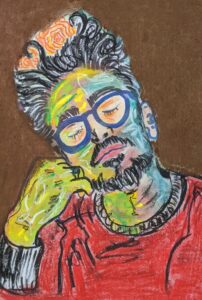“Fragmentary,” “broken” (Crazy from Swedish Krasa: to CRUSH), and a medley of narratives insisting on disconnect, either from the body, from the self, from language, or whatever apparatus needed to withhold the linear. I say it’s the opposite. If you’ve never been through it, you’re thinking of it wrong. This prevalent “absentia” is defined by the spectator of psychosis. To the psychotic, psychosis is to force a frame: an insistence on the current consciousness. Think of the wide spectra of consciousness the average person experiences during a normal day, from dreams to past to future. Psychosis is the opposite: you’re trapped within this Colosseum of Mile-High now, this single vision, singularity after singularity devouring your sense of subjectivity: you are what you see and what you see can not be avoided. There are no closed eyes in psychosis, there is no blinking. I feel it coming.
◊ ◊ ◊
I’m close to the edge. I know I’m going to have an episode soon, so naturally I refuse to sleep. After three hours of struggling to stay awake, I have a manic-state lucid dream where I sit under Christina’s window, my spine kissing the wall. I’m looking at the little garden, and the stairway teething from cement births a figure in a perpetual endless climb to Christina’s flat. I’m facing away, hoping my eyeline can converge with Christina’s on the same object. I know she’s inside. I can hear her reading from the book! It’s Sister Language! I wanna tell her I have read every word ten times over, but I just wait and listen. I look closer at the figure endlessly climbing the stairs. It’s Martha. Her sister! carrying groceries. They wrote the book together before Christina’s suicide. She’s here with groceries because she never forgets: the empath par excellence. Martha notices me, invites me up with a warm smile. But the warmth doesn’t stay for long. I know it’s not real. I’ve never met Christina, but I visit her window every time I’m close to the edge. Martha comes every day to bring her food, listens to her words from the outside. I wonder if she ever gets to the top of the stairwell. I walk up the stairs and sink deep into a roar that never surfaces, it just scratches the back of my throat until it coasts at the base of my skull, television static fizzing into a popping bottle of champagne. I surface into new vision. the alienation from the familiar. I’m in agony.
◊ ◊ ◊
It used to be like this: A few days of bliss before descent, white-knuckling my way through seconds, minutes, hours; never knowing which safeties would be gone when I opened my eyes, who was going to stay and who was leaving tomorrow, which safe space was going to turn toxic for the rest of my life. I used to live here, right on the line between sanity and… and what? The question has always been what’s on the other side. Some of us live here on the edge every single day, and some of us are more fortunate, like me. The meds finally worked, the rent finally rolled in, the loved ones stayed, that one-in-a-million employer understood, and countless other miracles made this house a home. But don’t forget, most of us never found the support we needed.
◊ ◊ ◊
Before reading the correspondence between the two Baillie sisters, and their seemingly endless climb to the very limits of language and its inefficiencies in conveyance, I had always given up not only on explaining myself, but even exploring myself through language. It was all until I read Christina’s attempts in peeling back the psychotic mind into language. Christina writes to her sister in Sister Language, “the legible text is always about & in the service of the illegible,” a sentence that I would have laughed at a year before, but which seeped into the depths of my soul. As Martha writes in the book itself, Christina’s voice is “Intensely Communicative.”
◊ ◊ ◊
Reading Sister Language seemed to assert that poetry held the key to the psychotic mind, that its leaps and omissions forced the neuron web to free associate into the holy anathema of psychosis.
I met Martha for the first time, as the figure silently weeping in the corner of a room. I asked who she was. heard about the book. Heard about the suicide. Picked up the book and didn’t put it down till I had read the last page. I ran into her a few hours later, and we spoke about how much the book had moved me. Martha told me Christina would have loved to have met me in real life.
Months later, I approached Martha to let her know that Sister Language had been a life-changing book in the true sense of the world, a piece of literature that had transformed my darkest fears into a holy transcendence.
◊ ◊ ◊
I had my second-worst psychotic episode on June 20, 2020. I called my partner as soon as I felt it coming and she talked to me with tenderness and care for hours, but I was still a single wrong word away from bursting into a primal urge to self preserve. A preservation of identity, of selfhood, of consciousness. I was dipping into nothingness between words, not remembering if I had ever existed before the word uttered right that minute. Thoughts were becoming louder. I finally became too dissociated to speak so I hung up the phone on my partner and sat behind my computer. At a moment of complete desperation, the only refuge was Christina’s words from Sister Language. She had given me new language to express myself, and it was her sister Martha’s incision into Christina’s psyche that had brought out the single most efficient narrative on psychosis.
I read Sister Language until my reality began to leave me behind. I was running after myself, a few steps behind, watching my input-delayed movement and sinking deeper into the Trainspotting rug of my vision. I don’t know about others, but for me the hardest part of psychosis has always been the descent itself. After a few episodes it can be quite recognizable, and the agony of knowing is the hardest part. For me, it’s always best foretold with a profound distrust of colours. Red takes on a whole new persona, colours shift and take on new characteristics and this is always the last step into a mental journey into the unknown. I know I am close when I don’t trust red anymore.
◊ ◊ ◊
I saw red, bee-striped with ribbons of black. I felt the last throes of reality in my mind and was about to give up fully when I heard Christina speak to me from her window. It was the opening words from Sister Language: “Randomness pulls: & something pulls back. I am the something, but am also its attraction to randomness: or how the random is drawn ineluctably to it, how the random always finds it (me) out.”
◊ ◊ ◊
Christina’s with me, talking to me, caressing me with her words. Christina is the randomness that pulls me back into consciousness: “I felt I could experience existence only as language-seen-by-language.”
◊ ◊ ◊
I open a word file on my computer and begin to write in an attempt to preserve my existence through panoptical language. Half of my mind is in childhood picking orange blossoms=the randomness, the other half is present because of language=pulling back. I’ve preserved my identity through words that may or may not make sense, but this tapping of keys, this writing of words, this thin black cursor flashing | . | . | as if proclaiming I! I! I! I! meaning: I can write! However fragmented, I’m still united through language. My language knows that I am neither behind the computer screen, nor in childhood smelling blossoms. My language knows I’m the abyss of an eyelid, the synaptic whisper between the explosion of intent coasting into murmurs of extent then stranded into words onto the page onto the eyes onto the mind back into intent, climbing down the thought-ladder one synapse at a time till sunken into memory and preserved forever in the eternity of an instant.
◊ ◊ ◊
I am here, oscillating in and out of nothingness with every tick of the cursor. I am existentiated in the thoughtspan of a single word, I am annihilated in silence. I look up: I’ve written “Words walk me to myself” and they have. I’m sitting under Christina’s window, weeping hopefully. I’ve found something that unifies me into a whole. In the eyes of time, I’m absent and fragmented, but in the heart of language I’m cyclical, neverending.
◊ ◊ ◊
For the first time in hours, I feel calm enough to be able to assess my surroundings. It’s been 6 hours since the start and it’s the first time that I’ve prevented myself from slipping out of reality, owing first to my partner’s patience and understanding, and then to the power of language and poetry. It’s dark outside, so I can see myself reflected in the window. I look myself in the eyes as a thought inhabits me. It’s not just a thought, but a truth seeping into my entire body: I feel washed over by a cosmic holiness. I realize that what mysticism has always preached as “Ego Death,” “Nirvana,” or the Sufi plight for “Fanaa” may all be plights for the dissolution of consciousness and individuality into psychosis: another world for cosmic consciousness. How in Rumi’s poetry madness is synonymous with divinity, not only syntactically, but etymologically.
◊ ◊ ◊
I remember language again. I remember the words of Rumi. I remember how one of his most famous verses says “Set aside all delusion! Become Mad (‘Divaaneh’ in the original language).” It has always been translated to “Become Mad” or “Crazy,” but The Farsi word for crazy “Divaaneh” literally means to act like a “Deev”(often translated to “Demon” from “Daemon” itself a Greek tool for divine conveyance). Deev’s Avestan root “Da’eva” is akin to Sanskrit “Deva” that gives English “Deus” and “Divine,” while the word “Da’eva” itself moves through Europe and throughout the years becomes “Devil.” There is also the word Majnun, literally meaning possessed by a “Djinn,” a Qur’anic Demon, often said to share an etymology with “Genie” and “Genius” (itself the Roman appropriation of the word “Daemon”). Language seems to always conflate madness with divinity. In fact, each language paves its own path and following the kinship shows Euphemisms and Dysphemisms, from a “Daemon” being shaped into an evil “Demon” or a “Deevaneh” going from holy cosmic connection to “Madness” and “Illness.”
I began rethinking not only “Illness” but about why it was named an illness while so many ancient cultures from East Asia to Turtle Island deemed such lapses in consciousness the holiest of human experiences. Before the descent into psychosis, as I sat under Christina’s window, and caught a glimpse of myself in the mirror. Christina’s voice cradled me as I looked deep into my own eyes, feeling a holy kinship to history’s greatest mystics: all who broke the spell of consciousness to swim in the divine, unable to unsee the vastness of the oceans of expression available to all who cheat reality.
◊ ◊ ◊
I’m one in a thousand, and by that I mean I’m one in a thousand in the world of psychosis. My experiences are irregular, short, and I live with a psychiatrist mother and have access to a loving partner who helps selflessly and with endless patience and understanding. I have experienced psychotic breaks less than ten times, each debilitating me for months at a time. It’s important here to discuss those for whom psychosis is a monthly, if not daily, reality.
After the first experience of psychosis, it often becomes easier to pinpoint the descent. As psychotics, when we realize that we may be nearing a psychotic state, it’s quite normal for us to distance ourselves from others and seek a “safe space,” whatever that defines in every psychotic’s vocabulary. It’s at this point where the greatest threats to our health pose themselves. Not all of us are surrounded by people knowledgeable about psychosis, not all of us enter psychotic states in proximity to our “safe spaces,” wherever they may be. Not all of us have a “safe space” to begin with.
The problem poses itself where commonly deemed “safe spaces” cease to become that. It can be as easy as a misunderstanding neighbour, a single phone call, a knock at the door. The night I had this breakthrough experience—first due to the tender care of my loving partner, and then because I took refuge in my safest of safe places—was the same night that Ejaz Chaudry was shot dead by the police, who entered his house while he was struggling with a psychotic episode. A man, in the “safety” of his own home, shot dead.
The systemic power provided to institutions in restraining and detaining the psychotic is noteworthy. Here I’d like to acknowledge the utterly invaluable work done by mental health workers, and the amount of help they provide to countless mental patients; but nonetheless, the fact that they can forcefully detain—employing as much force needed from the police—is undeniable. As Erin Soros, a fellow psychotic friend, once said: “I don’t fear psychosis. I fear psych wards.”
The night of my “revelation” to a better understanding of psychosis, the night that changed me forever, it took 3 whole hours of tender, patient talking to keep me calm and ensure the fear and stress of undergoing psychosis did not result in any variety of behaviour deemed threats to society; either warranting a police call or any spectra of trouble that follows.
In a society with so little mental health help and understanding, most psychotics’ first episodes ruin them financially. I’ve known enough psychotics to know how a majority of the homeless I see on a daily basis are psychotics who never had the privileges I had, with little to no chance of financial and mental recovery.
Language is a great key to conveyance, and conveyance is at the heart of understanding. Empathy can sometimes be even stronger than sympathy. A greater education on mental health and disability will bring about change over time, but let’s not forget the world today, where the average psychotic is abandoned in the arms of the city in absentia, haunted and hunted by exactly what abandoned them first. An endless line-up of mentally ill, in a constant cycle of being picked up and abandoned by various authorities in profound depravity.
◊ ◊ ◊
After I finished writing, I felt calm, but in no way was I out of the woods, so I just stared at the few pages of poetry I had written and wondered if these words would ever mean anything to another mind. How could language ever yield to history?
I read the words over and over until they became scribbles. Squiggly lines. Vibrations. Signs as absurd as they are in the depths of self-realized subjective reality. The psychotic mind is the holy language of puritanical expression. The cosmic consciousness sits in the psychotic mind, remembering individuality. Language may be the framed as our key to individuality, but the universal absurdity of human expression is inherent in every letter.
◊ ◊ ◊
I sit back down under Christina’s window, smelling everyone-I-loved-as-a-child.
I sit back down under Christina’s window listening to words dissolve into dreams.
I sit back down under Christina’s window a little closer to the divine.
…
 Khashayar “Kess” Mohammadi (he/they) is a queer, Iranian born, Toronto-based poet, writer, and translator. They are the winner of the Vallum Poetry Prize in 2021 and author of four poetry chapbooks. Their debut poetry collection, Me, You, Then Snow, is out with Gordon Hill Press. Find them on Twitter: @DearKestrel
Khashayar “Kess” Mohammadi (he/they) is a queer, Iranian born, Toronto-based poet, writer, and translator. They are the winner of the Vallum Poetry Prize in 2021 and author of four poetry chapbooks. Their debut poetry collection, Me, You, Then Snow, is out with Gordon Hill Press. Find them on Twitter: @DearKestrel





